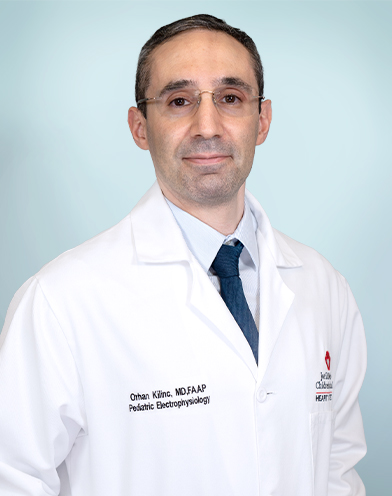Cardiac Ablation
Cardiac ablation is a non-surgical treatment for arrhythmia. Our pediatric cardiac ablations have a 95% success rate in treating arrhythmia.
Cardiac ablation is one of the treatments for arrhythmia (an abnormal heart rhythm). It is an interventional procedure, which means that it is nonsurgical.
We do about 90-100 cardiac ablations a year in our electrophysiology lab – and we have a 95 percent success rate. This means that 95 percent of the time, this one procedure gets rid of a child’s arrhythmia.
Call us for more information or to schedule an appointment
954-265-3437What Is Cardiac Ablation?
Cardiac ablation uses heat or cold energy to safely and carefully destroy the small areas of heart tissue that cause your child’s abnormal heart rhythm. We target the specific area associated with the arrhythmia, and it does not harm your child. In fact, for many children, one ablation procedure cures their arrhythmia.
Depending on where the arrhythmia is located, we may use radiofrequency (heat) or cryoablation (cold) to destroy the tissue that is causing problems. We use ablation primarily to treat tachycardia (arrhythmias that involve the heart beating too quickly). Read more about types of arrhythmia.
Why Choose Us for Cardiac Ablation?
We perform ablations on about 90-100 children a year, treating each one as we would our own child. We offer:
Our program leader is fellowship-trained in both pediatric cardiology and pediatric cardiac electrophysiology, which indicates extensive, specialized training in these areas.
Learn more about the heart care team.
We treat many young children, though the majority of our patients are adolescents and young adults. We have a 95 percent success rate in treating tachycardia arrhythmias with ablation. In the unusual event that arrhythmia recurs, we can perform a second ablation.
Before we ablate, we first use imaging and electrophysiology studies to determine the type of arrhythmia. We use some of the latest, most advanced equipment available, including 3-D mapping. With 3-D, we can get a clear picture without using radiation (X-ray).
Learn more about cardiac imaging.
Our team works together as one to treat your child. Specialists in heart imaging, cardiology, anesthesiology and intensive care all come together to treat your child.
Learn more about our team.
Some arrhythmias are inherited. We partner with genetic specialists to test families, and we offer genetic evaluation and counseling. If an inherited arrhythmia can be treated with ablation, we can treat the entire family, including adults.
Cardiac Ablation: What to Expect
Cardiac ablation is a minimally invasive procedure. This means that it isn’t surgical, but it does involve anesthesia and a short recovery. Here are some key things to know:
- Children receive an IV with medicine to help them relax, as well as anesthesia. They will be asleep the entire time during the procedure and will not feel anything.
- Ablation requires no incision and no sutures. Instead, we use a small needle puncture to insert a catheter (a long thin tube) into an artery in your child’s leg. We thread the catheter through the blood vessels to the heart, and send energy (heat or cold) through to target the tissue causing the arrhythmia.
- Ablation generally takes 2-3 hours to complete.
- Most children go home after spending the night in the cardiac intensive care unit so we can monitor them carefully.
Call us for more information or to schedule an appointment
954-265-3437
It matters to you. It matters to us.
Joe DiMaggio Children's Hospital Quality and Safety
See our hospital's patient satisfaction numbers, number of patients and more.
View Quality and SafetyYou have a Right to Know About Prices
We want to give you the information you need to make important healthcare decisions, including the costs of our services.
View PricingMyChart Portal
View test results, schedule follow-up appointments, request prescription refills and more.
Login or Sign-up to MyChart




